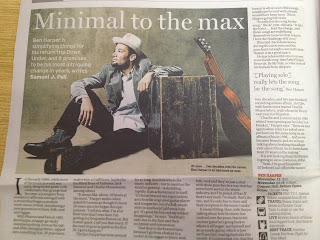For online version, click here
Minimal To The Max
In the early ‘90s,
whilst most of the musical world was neck deep in the punk rock conformity that
grunge had become, a youngster from southern California emerged with a record
which began a modern roots music revival, introducing a whole new generation to
the blues, to folk, to soul and reggae.
 With Pleasure & Pain in 1992, Ben Harper,
a happy-go-lucky twenty-something, born at the tail-end of the swingin’ ’60s,
tapped into something which today, 20 years later, sees him a trailblazer,
lauded by the likes of The Blind Boys Of Alabama, Jack Johnson, Charlie
Musselwhite, the late John Lee Hooker and countless others.
With Pleasure & Pain in 1992, Ben Harper,
a happy-go-lucky twenty-something, born at the tail-end of the swingin’ ’60s,
tapped into something which today, 20 years later, sees him a trailblazer,
lauded by the likes of The Blind Boys Of Alabama, Jack Johnson, Charlie
Musselwhite, the late John Lee Hooker and countless others.
“It’s been beyond
my expectations as to how far a lap steel guitar player and songwriter out of
southern California [can go], it’s gone far beyond my wildest imaginings,” says
Harper on his career thus far, one which has yielded a slew of seminal records,
two Grammy Awards and the recognition of artists he grew up idolising.
“And that’s only
due to the fans and their reception and connection,” he adds. “And they’re the bravest fans, because I go
from a ballad to a rocker, from reggae to blues, soul, folk, rock and they’ve
just rolled with those punches in a way that has never been seen in the music
industry, and I’m proud of that. If
there’s any mark I’ve made, that’s the one, and it’s only due to them and their
reception to the music I make.”
It seems fitting
then, with Harper talking about how his music has evolved over the years, that
in his current guise, he’s going back to where it all began – just himself and
an acoustic guitar, which is how we’ll see him touring Australia this
month. “It is great,” he exclaims, not
having performed solo acoustic to this extent before. “I can turn on a dime… you can just go
wherever you want to go. Not that I
can’t with a great band, but there is something incredibly liberating about
being up there on your own – it’s as much fun as I’ve ever had making music.”
It’s interesting
too, that this format is where a lot of his songs, usually performed with a
band, would have originally been born – this is indeed Harper going full
circle. “Precisely,” he says. “It really
lets the song be the song. It lets the
lyrics… lead the charge, and these songs are redefining themselves to me, for
that reason. I love the challenge of it
[too].”
In addition to
stripping his music right back in the live setting, in the studio Harper is
looking back as well, having just reached back to his ultimate muse, the blues,
recording a blues album with harmonica legend Charlie Musselwhite, with whom
Harper will tour next year for Bluesfest.
The album, entitled Get Up!,
has been a long time coming.
“Charlie and I
connected in 1995 when I was opening up for John Lee Hooker,” Harper
explains. “Then we met again when John
Lee asked us to perform on the same song on an album of his in 1998… and so we
became friends, and we’ve been talking about making this album ever since
[then]. So it’s been damn near 20 years
in the making.”
“And it just rolled man,” he laughs, “it was so much
fun.” The fact Harper can still get so
much joy out of making the music that he first began to vibe on more than two
decades ago, speaks volumes. He may, at
this point in his career, be taking it back to where it all began, but he is
still very much looking forward.
Samuel J. Fell








